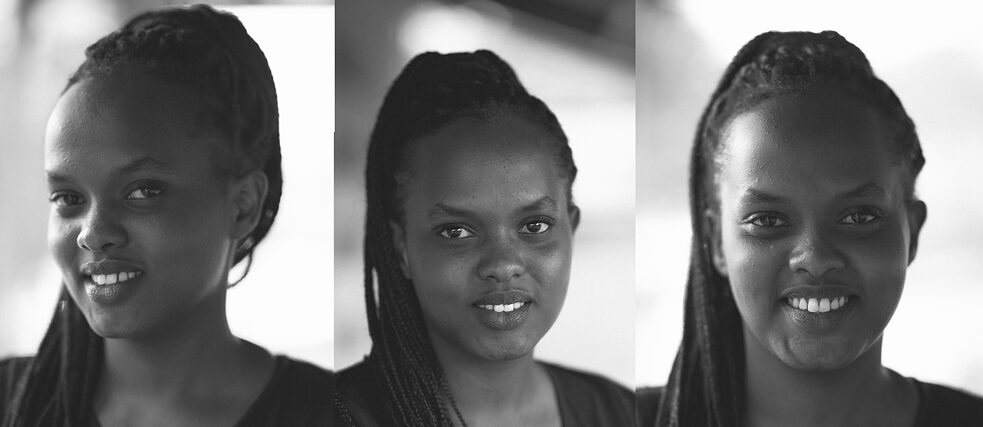Sandrine Gasabarage Niyonkuru

Sandrine Gasabarage Niyonkuru, a young post-memorial girl [1], second child in a family of four girls, and the first born after the genocide.
When I hear family, I first of all think of something essential. It’s very important to have a family, you can’t do without one. When it comes to evoking the emotional dimension of the family, Sandrine evokes a pair that she explains: love and worry. The family is an object of love, because it brings love and receives love, but at the same time, you are very worried about your family. “I grew up in a family of genocide survivors, but both my mother and father survived almost alone from their families. I don’t know what it’s like to have grandparents, aunts or uncles, except, of course, for the families we have chosen for ourselves. I still have anxiety linked to this singular past, an anxiety with which we live.”
In the family, we live a lot among ourselves. This is because my parents settled in a town that is neither theirs nor that of their parents, a town they had never lived in before the genocide. We live among ourselves, and so we talk a lot about both positive and serious things.
The girls’ room is a place we often go to with our mother, where we laugh, chat, dream and settle many things in our lives. Both the living room and the garden are other places occupied by the family’s discussions, often after meals. Although these spaces are used to talk while laughing, it’s also where serious matters are dealt with, such as successes or failures in school, where we talk about our report cards, and where pre-school speeches are held.
It’s mum who takes care of everything concerning school fees, choice of school orientation, etc., and daddy is the one who grumbles in case of difficulties in school. As such, the discussion can last for hours. If there is a social event to organise, like a wedding or a big party, mum is the one leading and informing us, collecting our ideas, and distributing roles. However, it’s dad who talks to us when we need to talk about our future trends. It’s daddy who leads the dance as far as the good resolutions at the beginning of the year are concerned, and that can last a long time. Whatever the subject, we are a family that lives by talking. We talk to each other a lot at home, almost all the time.
Our family is Christian, we pray but there is no dissension between us because praying is part of our family habits. However, there is no constraint, whether we go to mass or not, no one comes to create problems. Our parents have a need for religion, a little bit in order to organise their relationship with life, but more, it seems to me, to keep something of their life destroyed by the genocide. This is how I analyse the relationship with religion at home.
When the time will come for me to start a family, I will do everything I can to ensure that it goes well with the family I was born into, and even the one we formed as friends. I love my family very much, and I don’t see myself living without it. The man I love will be invited to get to know and love my family so that they can accept and love him too. I would very much like my children to know what my sisters and I didn’t know, that is, the love of grandparents. We didn’t have grandparents, and we live with this lack. Our parents often tell us about theirs, they tell us about their childhood, and I want my children to have a childhood with grandparents, aunts, cousins, etc., all those things we missed.
If I start a family, I’ll do everything possible to capitalise on what life afterwards has brought us. That is to say my parents gave us a lot of love, but also friends of theirs, who became a kind of aunts, uncles, and their children became our cousins. I’d like them all to be involved in the family I’ll start. Finally, I hope that Imana (God in the Rwandan sense) will be on my side.
[1] Marianne Hirsch refers to children who are born after major cataclysms, to underline that such events impact the generation after them.